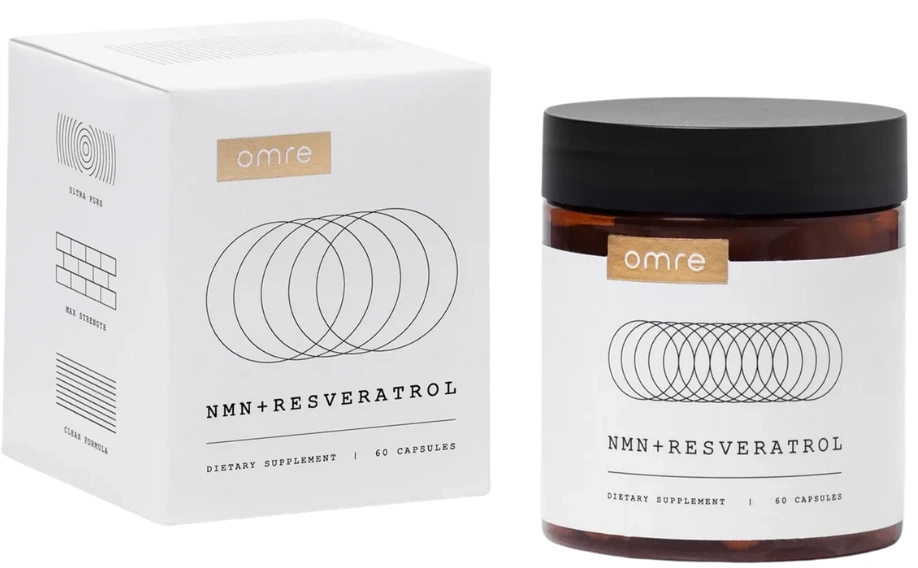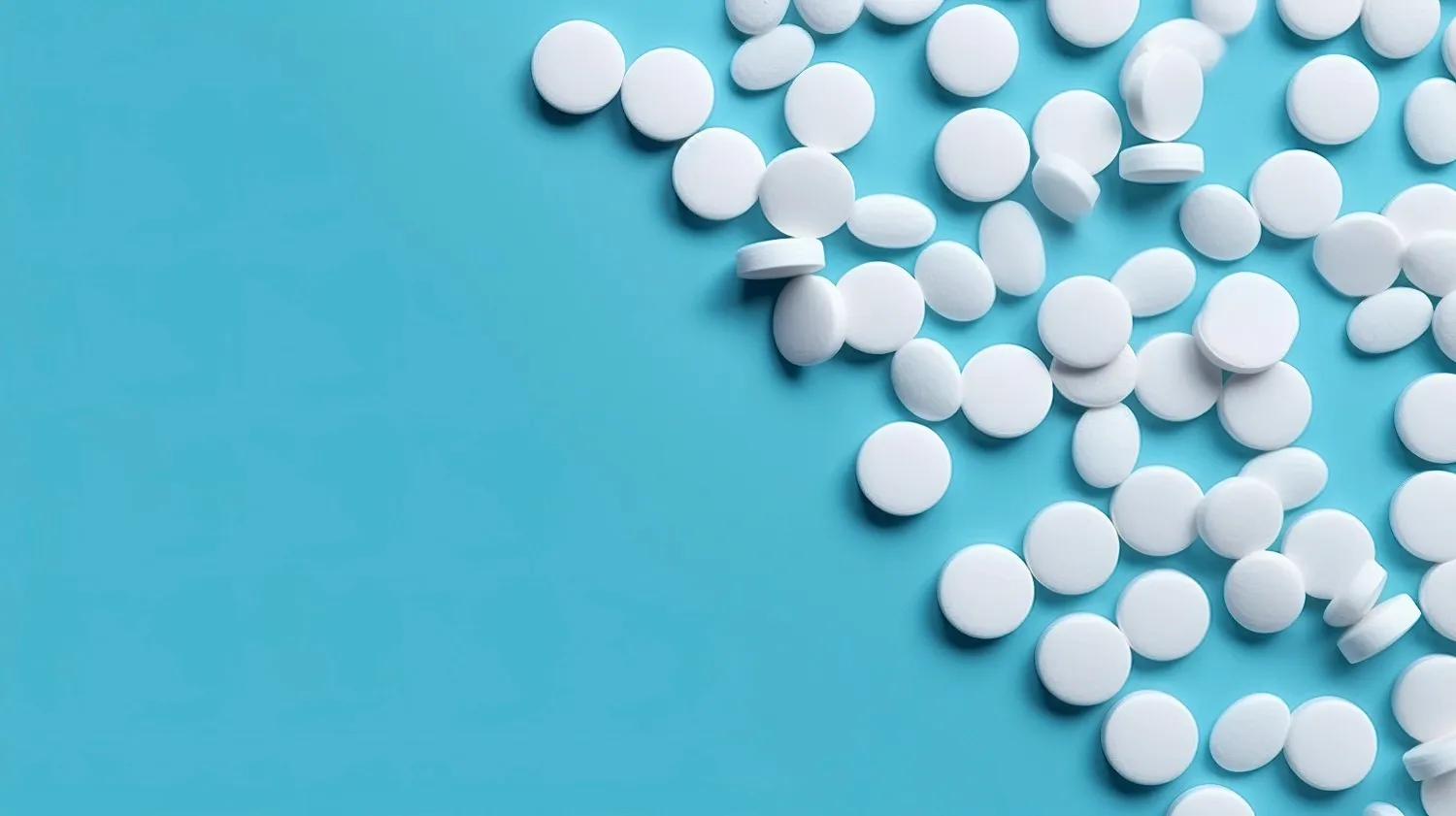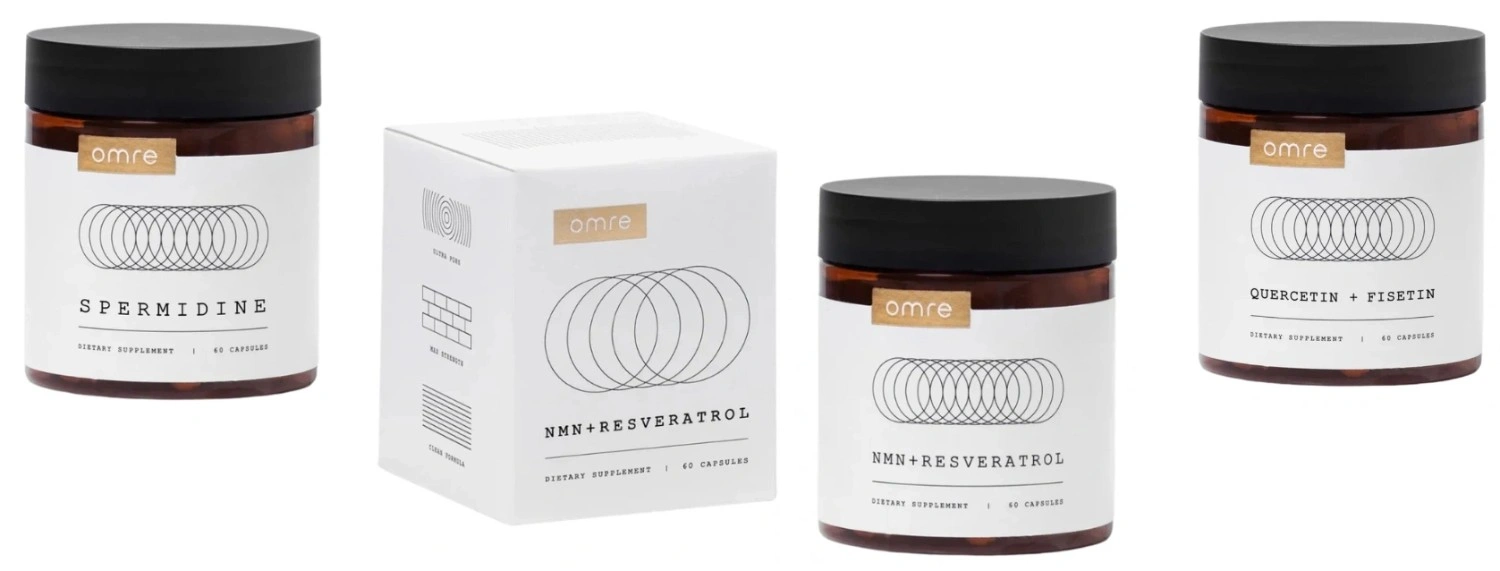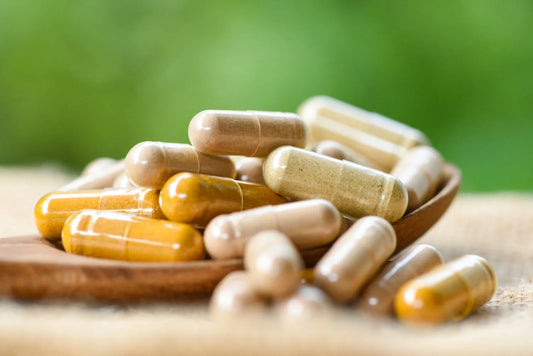Table of Contents
- Cellular NAD+ booster with ultra-pure NMN and Resveratrol at research-backed doses, the foundation of Sinclair-style longevity.
- David Sinclair Supplements 2025: Full Stack Overview
- What Supplements Does David Sinclair Take in 2025?
- What’s New in David Sinclair’s Routine for 2025
- Supplements David Sinclair May Have Stopped Taking
- How These Supplements Target Aging
- David Sinclair’s Longevity Lifestyle Beyond Supplements
- Is It Safe to Try David Sinclair’s Stack?
- Conclusion
- FAQs: Inside David Sinclair’s 2025 Longevity Routine
Few names in longevity research are as influential as Dr. David Sinclair, the Harvard geneticist redefining how we think about aging.
In 2025, his supplement stack continues to spark curiosity worldwide, a daily routine built around science, not hype, to support NAD+ levels, cellular repair, and metabolic health.
If you’ve ever wondered exactly what Dr. Sinclair takes and why, this comprehensive guide breaks it all down, from dosages and timing to the cutting-edge research behind each choice.
And if you’re a health enthusiast or someone just starting their longevity journey, you’ll see how these supplements target the core drivers of aging: energy decline, oxidative stress, and cellular wear.
Cellular NAD+ booster with ultra‑pure NMN and Resveratrol, at research‑backed doses.*NMN + RESVERATROL
Cellular NAD+ booster with ultra-pure NMN and Resveratrol at research-backed doses, the foundation of Sinclair-style longevity.
Before diving into his entire stack, it’s worth highlighting one cornerstone of David Sinclair’s routine, NMN + Resveratrol.
This power duo supports NAD+ production (the molecule that fuels cellular energy and DNA repair) while activating sirtuins, the genes that govern aging and longevity.
Why it stands out:
Clinically aligned doses for real results.
Third-party tested for purity and potency.
Enhanced absorption with BioPerine®.
Supports daily energy, focus, and cellular resilience.
Start your own longevity journey with the same science-backed foundation — Try OMRE NMN + Resveratrol today.
David Sinclair Supplements 2025: Full Stack Overview
-v1761871530583.webp) Dr. David Sinclair’s 2025 supplement routine is one of the most talked-about longevity stacks in the world. The reason is that they’re a daily protocol built on decades of genetic and aging research.Each supplement targets a specific mechanism of aging, from boosting NAD+ levels and supporting mitochondrial function to reducing inflammation and improving cellular resilience.
Dr. David Sinclair’s 2025 supplement routine is one of the most talked-about longevity stacks in the world. The reason is that they’re a daily protocol built on decades of genetic and aging research.Each supplement targets a specific mechanism of aging, from boosting NAD+ levels and supporting mitochondrial function to reducing inflammation and improving cellular resilience.
David Sinclair’s 2025 supplement stack includes NMN (1g), resveratrol (1g), metformin (800 to 1,000 mg), taurine (2g), fisetin (500 mg), spermidine (1 to 2 mg), fish oil, alpha-lipoic acid (300 mg), vitamin D3, vitamin K2, TMG, aspirin, and rapamycin. Each one supports a different part of aging, like boosting NAD+, improving mitochondria, or reducing inflammation.
Below is a complete breakdown of the supplements Sinclair takes in 2025, based on his latest interviews, podcasts, and insights from his book Lifespan.
Why His Stack Works
Each component of Sinclair’s regimen plays a strategic role in combating the biological hallmarks of aging, including NAD+ decline, oxidative stress, mitochondrial dysfunction, and cellular senescence.
Together, these supplements form a multi-pathway defense that doesn’t just slow visible signs of aging but aims to extend healthspan, the years of life spent feeling strong, alert, and energized.
Sinclair’s foundation and the same science powering OMRE NMN + Resveratrol begins with NAD+ restoration. It’s the starting point for every longevity plan worth its science.
Explore OMRE NMN + Resveratrol: clinically dosed, third-party tested, and formulated to mirror the cornerstone of Sinclair’s stack.
What Supplements Does David Sinclair Take in 2025?
David Sinclair’s 2025 supplement stack reflects years of longevity research distilled into a practical daily routine. Each supplement supports a different biological mechanism, starting from cellular energy and mitochondrial health to DNA repair and inflammation control.
Here’s what David Sinclair takes daily in 2025 to support healthy aging, NAD+ levels, and cellular repair, which you might want to try out:
NMN (Nicotinamide Mononucleotide) – 1g
Resveratrol – 1g
Metformin – 800–1,000mg
Spermidine – 1–2mg
Fisetin – 500mg
Taurine – 2g
Fish Oil (Omega-3s) – dose not specified
Alpha Lipoic Acid (ALA) – 300mg
Vitamin D3 – 4,000–5,000 IU
Vitamin K2 – 180–360 mcg
Trimethylglycine (TMG) – 500–1,000mg
Low-dose Aspirin – 83mg
Rapamycin – dose not publicly confirmed
NMN (Nicotinamide Mononucleotide) – 1g per day
NMN is a molecule that helps the body produce NAD+, which is essential for energy and cell repair. Sinclair takes 1 gram of NMN each morning, often mixed with yogurt to aid absorption and support cellular health and energy metabolism by boosting NAD+ (nicotinamide adenine dinucleotide) levels.
Something he’s mentioned repeatedly in podcasts and interviews as part of his NAD+ boosting protocol.
He believes it helps restore youthful energy at the cellular level, saying in an interview, "NAD+ is the closest we've gotten to a fountain of youth."
Scientific evidence suggests NMN can boost NAD+ (nicotinamide adenine dinucleotide), a key component in cellular energy production and DNA repair processes, which naturally decline with age (1).
A 2022 human trial showed NMN has what it takes to improve muscle strength and insulin sensitivity in older adults. While long-term safety is still being studied, early results are promising (2).
For many, NMN is their go-to for a vitality-focused supplement plan. Inspired by Sinclair’s approach? Try OMRE NMN + Resveratrol — a clinically dosed blend supporting NAD+, energy, and cellular health, third-party tested for purity.
Inspired by Sinclair’s approach? Try OMRE NMN + Resveratrol — a clinically dosed blend supporting NAD+, energy, and cellular health, third-party tested for purity.
Resveratrol – 1g per day
Resveratrol is a natural compound found in red grapes and berries. It's known for activating sirtuins, proteins that protect our DNA and may slow aging.
Sinclair takes 1 gram of resveratrol every morning with yogurt or olive oil to improve absorption.
He was one of the early researchers to highlight resveratrol's potential. Although human studies are limited, animal studies suggest it may reduce inflammation and improve heart health (3).
Some experts recommend pterostilbene as an alternative due to better absorption, but Sinclair still sticks with resveratrol.
Pair resveratrol with NMN for synergistic NAD+ support; it’s the combination Sinclair trusts daily.
Metformin – 800–1,000 mg per day
Metformin is a common diabetes drug that Sinclair uses for its potential anti-aging effects.
He takes it at night but skips it on workout days, citing concerns it might interfere with exercise benefits and mitochondrial health. In his words: "I take metformin not because I have diabetes, but because of its potential to mimic fasting."
Studies have linked metformin to improved insulin sensitivity and even longer lifespans in diabetic patients (4).
However, it can cause digestive issues and may lower vitamin B12 over time, so it should only be taken under medical guidance.
Spermidine – 1–2 mg per day
Spermidine is a food supplement found in wheat germ and cheese, valued for its role in cellular renewal and promoting autophagy—a biological process key to maintaining healthy cells and combating age-related diseases.
Sinclair takes it in the morning alongside his other core supplements.
Animal studies show spermidine may support heart health and brain function as we age (5). Though human research is still early,
Sinclair says, "Spermidine helps mimic the effects of fasting, which is key to healthy aging."
For those exploring Sinclair-inspired stacks, OMRE’s Spermidine offers this same autophagy-supporting compound in research-backed purity.
Fisetin – 500 mg per day
Fisetin is a plant-based senolytic, meaning it helps the body clear out old, damaged “zombie cells” that accumulate with age.
Spermidine is a food supplement found in wheat germ and cheese, valued for its role in cellular renewal and promoting autophagy—a biological process key to maintaining healthy cells and combating age-related diseases.
Sinclair takes it in the morning alongside his other core supplements.
Animal studies show spermidine may support heart health and brain function as we age (5). Though human research is still early,
Sinclair says, "Spermidine helps mimic the effects of fasting, which is key to healthy aging."
For a dual-action approach, OMRE’s Quercetin + Fisetin blend supports both senolytic and antioxidant defenses. (Learn More).
Quercetin – 500 mg (cycled)
Quercetin is another senolytic found in onions, apples, and capers. Sinclair used to take it regularly but may now cycle it or take it occasionally. Recent insights suggest that high doses might interfere with certain cellular pathways like SIRT6.
Still, quercetin has been shown to fight inflammation and oxidative stress (7).
It often works best when paired with fisetin, though some longevity experts recommend using it in moderation or relying on diet alone.
Taurine – 2g per day
Taurine is an amino acid that supports heart health, reduces oxidative stress, and may help maintain mitochondrial function (8). Sinclair started taking 2 grams daily after studies showed it extended lifespan in mice by up to 12%.
He admits the science is still evolving, saying, "Taurine is interesting because it seems to promote longevity despite activating mTOR, which usually speeds up aging."
He takes it in the morning, monitoring how it affects his biomarker.
Fish Oil (Omega-3s) – Dose not specified
 Omega-3 fish oil is rich in EPA and DHA—fatty acids known to support cardiovascular health, cognitive function, and reduce chronic low-grade inflammation linked to age-related decline.
Omega-3 fish oil is rich in EPA and DHA—fatty acids known to support cardiovascular health, cognitive function, and reduce chronic low-grade inflammation linked to age-related decline.
Sinclair recently added it to his stack, likely for its anti-inflammatory and cognitive benefits.
He hasn’t publicly shared his exact dose, but longevity experts like Dr. Andrew Huberman and Dr. Peter Attia have publicly stated they take around 2g of EPA and 1.5g of DHA daily, highlighting the role of omega-3s in brain and heart health.
Fish oil may also help reduce blood triglycerides and protect against age-related decline (9).
Alpha Lipoic Acid (ALA) – 300 mg per day
Inspired by Dr. Denham Harman, who promoted it for longevity, ALA is a potent antioxidant and mitochondrial cofactor, essential for turning nutrients into energy.
Sinclair reintroduced 300 mg of ALA daily, typically taken on an empty stomach to maximize absorption.
It supports glucose regulation, nerve protection, and oxidative defense. Although research is mixed, Sinclair views it as part of a comprehensive energy-optimization strategy.
Vitamin D3 – 4,000–5,000 IU per day
Vitamin D plays a key role in immune response, mood regulation, and maintaining bone strength, and deficiency in humans has been linked to autoimmune diseases and increased risk of heart disease.
Sinclair takes 4,000 to 5,000 IU per day—a dose higher than standard recommendations but common among longevity enthusiasts.
A 2017 meta-analysis found that vitamin D3 supplements may reduce mortality risk in older adults (10).
Sinclair pairs vitamin D3 with vitamin K2 (180–360 mcg daily) to optimize calcium metabolism and prevent calcium buildup in arteries, reducing cardiovascular risk while supporting bone density.
Vitamin K2 – 180–360 mcg per day
K2 helps direct calcium to bones instead of arteries, reducing the risk of hardening of the arteries. Sinclair takes it daily with vitamin D3.
Studies link K2 to improved heart and bone health, especially in aging populations (11). It’s a key partner to D3, and the two are often taken together to improve outcomes.
TMG (Trimethylglycine) – 500–1,000 mg per day
TMG, or betaine, supports DNA methylation and protects the body’s methyl groups, which can be depleted when taking NAD+ boosters like NMN. Sinclair takes 500 to 1,000mg daily alongside NMN.
He explains, "NMN can use up methyl groups, so I take TMG to avoid potential imbalances."
TMG (Trimethylglycine), taken at 500–1,000 mg daily, may also support DNA methylation, liver health, and help regulate homocysteine levels, which are linked to cardiovascular diseases.
Aspirin – 83 mg per day
 Sinclair takes a low-dose aspirin daily for its potential to reduce cancer risk and inflammation.
Sinclair takes a low-dose aspirin daily for its potential to reduce cancer risk and inflammation.
While older studies supported aspirin’s role in reducing heart attack risk and inflammation, recent clinical studies highlight mixed results, especially for healthy non-diabetics and those already using blood thinners.
Aspirin can increase the risk of bleeding, so it should only be considered with a doctor’s advice. Sinclair has said he continues to take it, but this is one of the more debated parts of his protocol.
Rapamycin – Dose unknown (likely weekly)
Rapamycin is a prescription drug that targets mTOR—a key cellular growth pathway.
Both Sinclair and Dr. Peter Attia have discussed its potential in slowing aging, with Attia noting he takes 6mg weekly, though Sinclair hasn’t publicly confirmed his exact dose.
It has an extended lifespan in multiple animal studies (12). Sinclair is believed to take it weekly, possibly 6mg, though he hasn’t confirmed the dose.
It’s one of the most promising longevity drugs but may have side effects, especially with long-term use. Sinclair likely takes it under close medical supervision, and experts caution it’s not for everyone.
What’s New in David Sinclair’s Routine for 2025
As one of the world’s most followed longevity researchers, Dr. David Sinclair doesn’t just talk about anti-aging science he experiments with it daily.
In 2025, his supplement stack saw a few fascinating updates inspired by the latest research in mitochondrial health, inflammation control, and cellular rejuvenation.
Here’s what’s new and noteworthy in his current routine:
Taurine (2g/day) – Added after studies showed it may extend lifespan, boost mitochondrial function, and support heart health. Taurine’s ability to strengthen energy metabolism is one reason longevity experts are now paying attention.
Fish Oil (Omega-3s) – Added for its anti-inflammatory and brain-boosting benefits, especially important as inflammation plays a key role in aging.
Alpha Lipoic Acid (300mg/day) – Reintroduced after new evidence confirmed its role in protecting mitochondria and reducing oxidative stress, making it a natural partner for NMN and Resveratrol.
Rapamycin (weekly, dose unknown) – Perhaps the most exciting addition. This prescription drug targets mTOR, a key cellular growth pathway. In animals, it’s one of the few compounds proven to extend lifespan. Sinclair now reportedly uses it under medical supervision to explore its long-term effects.
Sinclair’s 2025 stack is shifting from just boosting NAD+ to targeting deeper aging mechanisms, starting from cellular cleanup to mitochondrial regeneration.
Supplements David Sinclair May Have Stopped Taking
Even the most advanced longevity experts evolve their protocols and Sinclair is no exception.
He frequently adjusts or cycles certain supplements based on emerging data, side effects, or improved alternatives.
Here’s what David Sinclair may have reduced or removed in 2025:
Quercetin – Once a core senolytic in his stack, it’s likely cycled out due to possible interference with SIRT6 and NRF-2, both vital for DNA repair.
CoQ10 – Previously used for energy support, but it no longer appears in his latest interviews. Some experts believe it’s less critical once NAD+ levels are optimized through NMN and Resveratrol.
Alpha Lipoic Acid (previously removed) – Though now reinstated, it was once paused due to inconsistent long-term research findings. Sinclair’s recent reintroduction suggests renewed confidence in its antioxidant potential.
The lesson here? Even at the cutting edge of longevity, flexibility matters. Sinclair’s willingness to adapt shows that anti-aging science is a moving target and the smartest approach is one that evolves with the evidence.
How These Supplements Target Aging
What’s brilliant about Sinclair’s stack is that it’s not random. Each compound supports a specific “hallmark of aging” the biological roots of why we age.
Here’s how his core supplements line up:
Aging Mechanism | Key Supplements |
NAD+ Decline | NMN, Resveratrol |
Mitochondrial Dysfunction | Taurine, ALA, TMG |
Senescent Cells | Fisetin, Quercetin (if used) |
Genomic Instability | Resveratrol, Metformin, Vitamin D3 |
Inflammation | Fish Oil, Aspirin, Resveratrol |
Autophagy & Cellular Cleanup | Spermidine, Rapamycin |
Epigenetic Alterations | TMG, NMN |
By targeting multiple hallmarks at once, Sinclair’s routine helps his cells repair, recycle, and regenerate, rather than merely masking aging symptoms.
The result is ever excellent: more consistent energy, clearer cognition, faster recovery, and a body that feels years younger from the inside out. This can be YOU with a simple decision to begin. (Join Us Now)
David Sinclair’s Longevity Lifestyle Beyond Supplements
Sinclair often emphasizes that supplements alone aren’t the secret; they amplify a healthy lifestyle.
Here’s how he integrates longevity into daily life:
Intermittent fasting: Often skips breakfast or lunch to mimic calorie restriction benefits.
Mostly plant-based diet: Prioritizes greens, olive oil, nuts, and fish while avoiding processed foods and sugars.
Regular exercise: Combines strength training, HIIT, and steady-state cardio for optimal metabolic health.
Cold & heat exposure: Uses sauna and cold therapy to trigger beneficial cellular stress responses.
Biomarker tracking: Monitors glucose, lipids, and aging markers with continuous testing.
Sleep optimization: Treats deep, consistent rest as a longevity tool — not a luxury.
His philosophy: “Age doesn’t have to equal decline. You can slow it if you understand your biology.”
Want to follow the latest longevity research and supplement trends like Sinclair? Subscribe to the OMRE Longevity Newsletter: get exclusive insights, science-backed tips, and members-only offers straight to your inbox.
(No spam. Just the latest breakthroughs in aging and energy.)
Is It Safe to Try David Sinclair’s Stack?
Here’s the truth: Sinclair’s regimen isn’t for everyone.
While supplements like NMN, Resveratrol, and Fisetin are safe for most healthy adults, otherslike Metformin and Rapamycin are prescription-only and require medical supervision.
Always consult with your doctor before starting any new supplement or medication.
While supplements like NMN, resveratrol, and fisetin are available over-the-counter, their long-term effects are still being studied.
What works for Sinclair may not be right for your individual health, especially if you're managing a medical condition or taking other medications. It’s important to evaluate your own goals and baseline health first.
That said, Sinclair’s stack has inspired many to take a proactive approach to aging.  If you’re just getting started, it’s smarter to begin with proven, research-backed essentials like: NMN + Resveratrol — supports NAD+ production and cellular repair.
If you’re just getting started, it’s smarter to begin with proven, research-backed essentials like: NMN + Resveratrol — supports NAD+ production and cellular repair.
Quercetin + Fisetin — aids senescent cell clearance and inflammation balance.
Spermidine — promotes autophagy and mitochondrial renewal.
All available through OMRE’s premium longevity collection, trusted by thousands for purity and potency.
Explore OMRE’s science-backed formulas → feel the difference in energy, focus, and recovery within weeks.
Conclusion
Dr. David Sinclair’s supplement routine isn’t a trend, it’s a living blueprint of modern longevity science.
His evolving stack blends NAD+ boosters, senolytics, and metabolic regulators to target the root causes of aging, all backed by ongoing research and personal experimentation.
As he continues refining his routine with new discoveries like Taurine and Rapamycin, one thing remains clear: aging is no longer an unstoppable process, it’s something you can influence.
If you’re inspired to start your own longevity journey, OMRE’s formulations mirror the same science Sinclair lives by: clean, potent, and backed by research.
Check availability now and take your first step toward younger cells and longer vitality.
FAQs: Inside David Sinclair’s 2025 Longevity Routine
What supplements does David Sinclair take daily?
David Sinclair’s 2025 longevity stack includes:
NMN, Resveratrol, Metformin, Spermidine, Fisetin, Taurine, Fish Oil, Alpha Lipoic Acid, Vitamin D3, Vitamin K2, TMG, low-dose Aspirin, and Rapamycin.
He tailors this regimen based on emerging research and often takes most supplements in the morning with yogurt or olive oil for optimal absorption. His protocol continues to evolve which is a prove that true longevity science never stands still.
Want a beginner-friendly version of Sinclair’s stack? Start with OMRE’s NMN + Resveratrol, the same foundational combo that powers his cellular energy and repair.
Does David Sinclair still take NMN?
Absolutely. Sinclair continues to take 1 gram of NMN daily. He calls it one of the key tools to restore NAD+ levels, the molecule that fuels energy, DNA repair, and resilience at the cellular level.
He typically takes NMN in the morning mixed with yogurt to boost absorption and pair it with healthy fat for maximum benefit.
Is Rapamycin part of David Sinclair’s stack?
Yes, it appears to be one of his latest and most advanced additions. While Sinclair hasn’t confirmed his exact dose, experts like Dr. Peter Attia report taking 6 mg weekly, and Sinclair has mentioned using it similarly.
Rapamycin works by targeting mTOR, a cellular growth pathway strongly linked to aging and longevity. Early studies show it can extend lifespan in animals, though human data is still developing.
Warning: Because Rapamycin is a prescription medication, anyone considering it should consult their doctor for professional guidance.
Why did Sinclair stop taking Quercetin?
Sinclair hasn’t formally announced dropping Quercetin, but experts believe he phased it out or cycles it due to possible interference with key longevity proteins such as SIRT6 and NRF-2.
Instead, he continues using Fisetin, which offers similar senolytic (cell-clearing) benefits without those potential drawbacks.
Looking to replicate that senolytic effect? Try OMRE’s Quercetin + Fisetin formula. This is a balanced, research-backed combo for healthy cell renewal.
Are Sinclair’s supplements safe to try?
Many are safe for healthy adults such as NMN, Resveratrol, and Fisetin but others, like Metformin, Aspirin, and Rapamycin, are prescription drugs that can interact with medications or conditions.
Always discuss your supplement choices with your healthcare provider before starting.
If you’re curious where to begin, start with Sinclair’s core stack:
NMN + Resveratrol for NAD+ and energy
Spermidine for cellular renewal
Fisetin + Quercetin for senolytic support
These are available through OMRE’s premium longevity collection. They are carefully designed for purity, transparency, and real-world results.
Not sure which longevity supplements fit your goals?
Join the OMRE Longevity Newsletter for exclusive science updates, expert tips, and early access to new formulations.





